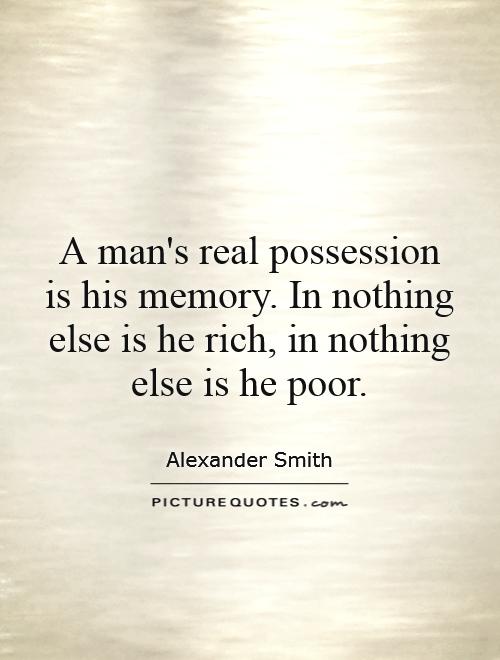A man's real possession is his memory. In nothing else is he rich, in nothing else is he poor

A man's real possession is his memory. In nothing else is he rich, in nothing else is he poor
Alexander Smith, a Scottish poet and essayist, once famously said, “A man's real possession is his memory. In nothing else is he rich, in nothing else is he poor.” This profound statement speaks to the power and importance of memory in shaping our identities and experiences.Memory is a unique and personal possession that is intrinsic to our sense of self. It is through our memories that we are able to recall past events, emotions, and experiences, and make sense of our lives. Our memories shape our perceptions of the world and influence our decisions and actions. In this sense, our memories are truly our most valuable possession, as they are the foundation upon which our identities are built.
In the context of Alexander Smith, this quote takes on even greater significance. Smith was known for his introspective and reflective writing, often exploring themes of memory, identity, and the human experience. His works, such as “A Summer in Skye” and “Dreamthorp,” are filled with vivid descriptions and poignant reflections on life and memory.
For Smith, memory was not just a tool for recalling past events, but a means of understanding and interpreting the world around him. Through his writing, he sought to capture the essence of human experience and the fleeting nature of memory. He understood that our memories are not just a record of the past, but a reflection of who we are and what we value.
In this light, Smith’s quote can be seen as a reminder of the importance of cherishing our memories and using them to enrich our lives. Our memories are a precious gift that can bring us joy, comfort, and wisdom. They are a source of strength and resilience in times of hardship, and a reminder of the beauty and complexity of the human experience.












 Friendship Quotes
Friendship Quotes Love Quotes
Love Quotes Life Quotes
Life Quotes Funny Quotes
Funny Quotes Motivational Quotes
Motivational Quotes Inspirational Quotes
Inspirational Quotes